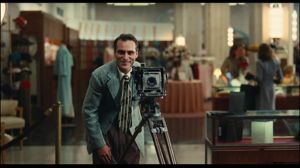Dear Faithful Readers,
"If you figure out a way to live without a master, any master, be sure to let the rest of us know. For you would be the first in the history of the world." -- Lancaster Dodd in The Master
One of the most interesting revelations during my time at the Cannes Film Festival this year was learning that this most prestigious of film festivals offers a Prize of the Ecumenical Jury. Created by Christian filmmakers, film critics, and film professionals, the objective of the award is to "draw attention to those works of quality which touch the spiritual dimension of our existence," and "reveal the mysterious depths of human beings". Winners have ranged from predicable choices like Jesus of Montreal (1987) and Of Gods and Men (2010), to less obvious selections like Paris, Texas (1984) and Cache (2005). Considering the country's strict laws of laicite (the separation of church and state), I was both bemused and inspired that the French have such a distinguished public platform to acknowledge films that promote shared human values.
I thought we should give it a shot.
Over 90% of Americans still answer "yes" to the question of whether or not they believe in God. But exploring faith on film is primarily restricted to documentaries and Biblical epics. That's why it seems a minor miracle that more than a few major Hollywood releases in 2012 were willing to ask big questions--with various degrees of success.
Here's a look at the way six major films found God in 2012.
The Tradition of Religion_ and Les Miserables_
Rebirth is one of the most powerful themes in theological discourse. The idea that a person can right their wrongs in pursuit of salvation is central tenet of all religions. It's also at the very heart of Victor Hugo's French novel Les Miserables, the story of a broken man who interprets an unexpected act of kindness as a divine second chance.
Director Tom Hooper avows Jean Valjean (Hugh Jackman) as his Jesus-proxy early on, mimicking the Passion as the hero carries his cross (the French flag poll) under the orders of Pontius Pilate-stand-in Javert (Russel Crowe). Valjean is then lost in purgatory, roaming the French countryside, before finding God the not-so-subtle form of a Catholic priest. Valjean's resurrection is asserted when he vows "Jean Valjean is nothing now, a new story must begin", framed by an overhead crane shot that ascends endlessly into the heavens and concludes the first chapter of the film.
Years later, he meets his Mary Magdalene, Fantine (Anne Hathaway), and transitions from Son to Father, caring for her daughter, Cossette. By the end of his journey, he completes the Trinity. His Holy Ghost helps usher in a full-chorus finale: a gospel of melodies reflecting the revolution's struggle for human dignity, justice, and freedom.
The film isn't just a parable about the power of forgiveness, but a metaphor about the healing effects of Christianity. We are compelled to take strength in the saints who came before us, live out the dreams they died for, and never forget their sacrifice.
It's all moving and unapologetically melodramatic, but to be a true believer, you'll first have to forgive Russell Crowe's singing.
The Recruitment of Worship_ and** **The Master_
Primarily interpreted as a thinly-veiled portrait of Scientology, The Master tells the story of one man's futile attempt to find greater meaning. The sexual and alcohol addictions of WWII veteran Freddie Quell (Joaquin Phoenix) ostracize him from others until charismatic leader Lancaster Dodd (Phillip Seymour Hoffman) invites him to join The Cause. But, despite Lancaster's best efforts to win over his petulant disciple, Freddie never fully commits himself to purpose. This is less a refusal of their nascent doctrine than Freddie's inability to give himself over to anything other than his own personal demons.
Many people (myself included) were expecting the film to cast a critical eye on new-age religiosity--specifically its apocryphal origins, philosophies, and inner practices. No one is likely to be converted to The Cause after viewing this film (well, almost no one), since writer and director P.T. Anderson, much like Freddie, is uninterested in exploring the finer points of its theology._ The Master__ _indulges our curiosity with "processing sessions" and one outright debate on the meaning of the word "cult", but we're never asked to empathize or even evaluate the movement itself. Instead, lush visuals, compelling performances, and beautiful period details are simply at the service of compelling characters.
There's a wonderfully meditative rhythm to the film, but The Master never attempts to explore notions of a higher spiritual power; only the power that man can exert over others by exploting those ideals.
Sincerely,

Christopher




